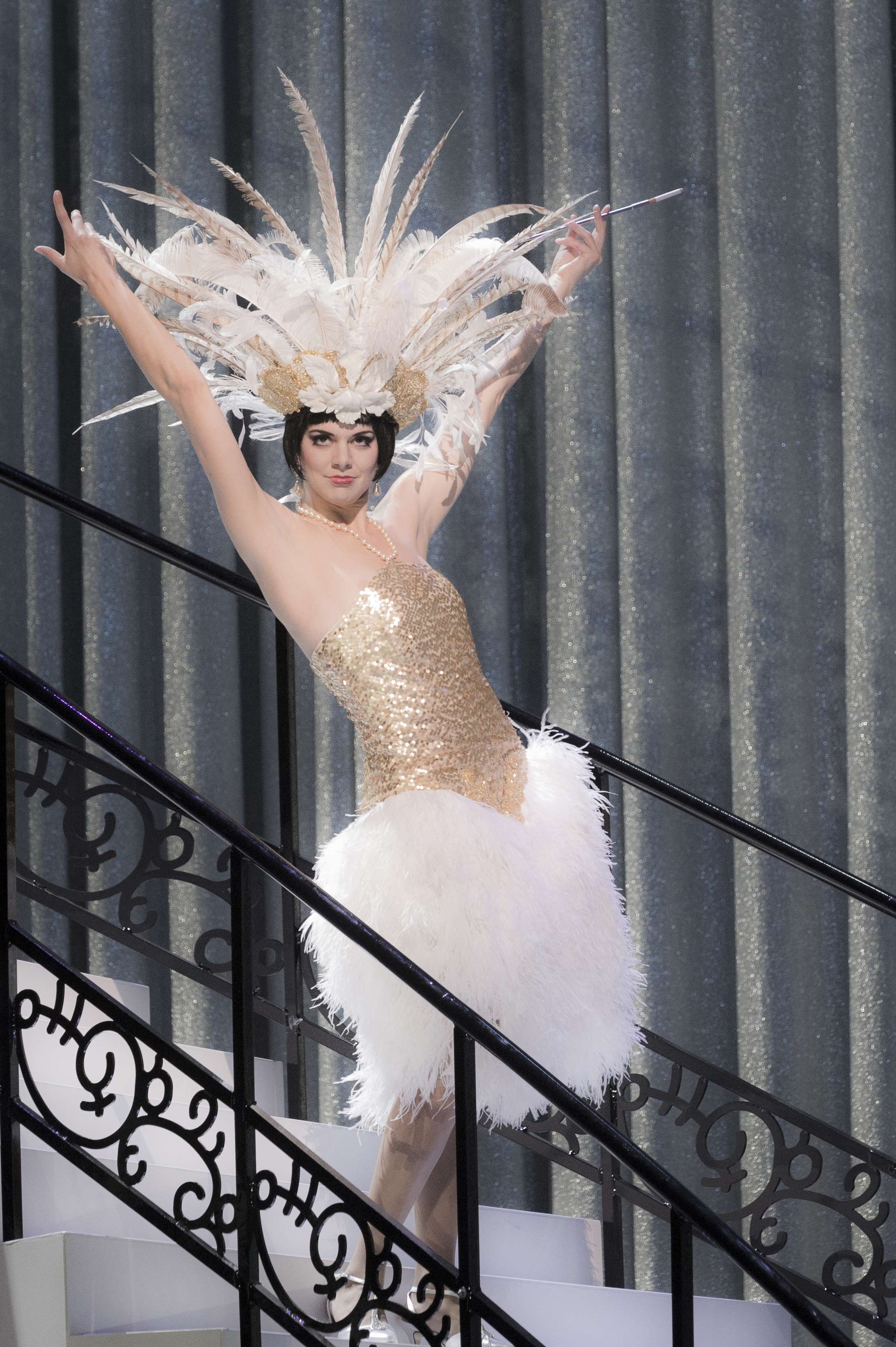|
Back
A welcome, if flawed, return Toronto
The Four Seasons Centre for the Performing Arts
10/04/2012 - & October 9, 12, 14, 17, 20, 24, 27, 30, November 1, 3, 2012
Johann Strauss II: Die Fledermaus
Tamara Wilson (Roselinda), Michael Schade (Gabriel von Eisenstein), Ambur Braid (Adele), Peter Barrett (Dr. Falke), David Pomeroy (Alfred), James Westman (Frank), David Cangelosi (Dr. Blind), Jan Pohl (Frosch)
The Canadian Opera Company Chorus, Sandra Horst (Chorus Master),
The Canadian Opera Company Orchestra, Johannes Debus (Conductor)
Christopher Alden (Director), Allen Moyer (Set Designer), Constance Hoffman (Costume Designer), Paul Palazzo (Lighting Designer)

A. Braid (© Chris Hutcheson)
Die Fledermaus has returned to the COC after an absence of 21 years in an innovative production by Christopher Alden who has given the company a rivetting (and oft-repeated) Der fliegende Hollšnder and last seasonís dazzling but wayward Rigoletto. This new production shares more with the latter work, alas.
Alden has updated the work to the 1920s which is not at all a bad idea as it can give rise to all sorts of jazz-age sass (which, after all, the 1874 work prefigures). Sigmund Freud is mentioned in the directorís notes. We donít get much analysis, however, but more of a surrealist take on the hectic proceedings, with Dr. Falke (Peter Barrett in fine voice) acting more like Mandrake the Magician in a batwing cape, with the rest of the cast being manipulated while he perches above it all on a giant pocket watch.
The cast members hurl themselves into their roles with apparent glee and itís not their fault that things donít always mesh. One problem is an awkward stage layout, with a bed (highly symbolic, that) always at stage left that is the locus of far too much action. In Act I it is where Roselinda disports herself, especially after her bumptious former lover, Alfred, appears - and they are joined by the prison warden Frank as well. In Act II it is where party host Prince Orlovsky spends most of his time, and in Act III, the prison scene, we find the jailed Alfred in it. Far too much action is thus relegated to one side of the stage.
The overall look of the piece, thanks largely to Constance Hoffmanís costumes, tends toward the outrageous. At one point the ensemble seems poised to launch into the "Springtime for Hitler" number from The Producers. If only! Much of the time they come across as a group eagerly dressed up for a party that doesnít quite come off.
One costume that does not work is that for Roselinda in Act II and III - it looks as if a large quantity of drapery fabric were simply dumped on hapless Tamara Wilson. While she misses out in the glamour department, she sings the role very well, notably the challenging Csŗrdŗs in Act II. Michael Schade, as her bent-on-mischief husband, Eisenstein, can almost be accused of overdoing things at times; itís not his fault that when Roselinda appears at the party she is relegated to a small coach for an inordinate length of time while he must evince rapture at the sight of her nose, mouth and chin.
One character who is given lots of time centre stage is Ambur Braid as the maid, Adele, and she makes the most of it in both of her numbers. David Pomeroy exudes brio as Alfred, dressed up as Don Ottavio or some such character from the opera repertory. Itís not his fault that some of his vocal outbursts arenít all that well-timed.
James Westman as Frank discovers - and revels in - the joys of cross-dressing while at the party; itís a pity that he resorts to shouting most of his lines.
An amusing moment in the original libretto occurs in Act III, when the jaded Prince Orlovsky breaks into laughter upon discovering that Eisenstein, bent an an illicit amorous adventure, has ended up flirting with his own wife. This bit is cut entirely, thus depriving Laura Tucker, who has given an all-out performance as the louche, epicene prince, of a well-earned moment at centre stage.
Actor Jan Pohl demonstrates model clear diction as the jailer, Frosch. The character is specified as being drunk but as drunkenness is no longer perceived as being all that funny he is presented as a martinet brandishing a riding crop, a Germanic stereotype from many a film. I suspect some sort of sexual kink is being referred to, but it doesnít come off.
Conductor Johannes Debus (a very popular figure locally who has just had his contract as Music Director of the COC extended to the 2016-2017 season) is up to his usual high standard on the podium.
There is much fun to be had in this production, but I have seen less ambitious productions that were more fun. Tossing mustiness aside is a good thing but trusting the material in a 136-year-old work can still pay off.
Michael Johnson
|